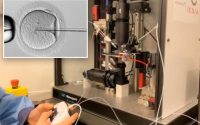COPD drug roflumilast could help retrieve lost memories
Scientists are one step closer to helping us retrieve that lost train of thought.
A new study published in the journal Current Biology suggests that forgotten memories could be retrieved days later by activating certain brain cells using a biological technique called optogenetics, or by taking roflumilast, an everyday drug typically prescribed to people suffering from chronic obstructive pulmonary disease, or COPD.
Using mice, researchers at the University of Groningen in the Netherlands set out to determine whether sleep deprivation leads to complete memory loss or merely a temporary loss of information in the brain that can be reversed.
The study featured rodents that were deprived of sleep for six hours and also involved tinkering with objects in their cage.

Days later, the mice could not detect that one of the objects in the cage was in a different position, proving that lack of sleep impacts memory.
Then, in an effort to restore the rodents’ memories, researchers tried optogenetics — the use of light to control the activity of neurons or other types of cells. The light activated certain neurons in the hippocampus region of the brain, which stores spatial information and merges memories.
“The information was, in fact, stored in the brain, but just difficult to retrieve,” neuroscientist Robbert Havekes explained in the study, as reported by ScienceAlert.com.
“This shows that the information was stored in the hippocampus during sleep deprivation, but couldn’t be retrieved without the stimulation,” Havekes said in the study.
What’s more, in a separate and less invasive approach to reactivating lost memories, researchers used roflumilast, said to boost levels of a cell-signaling molecule that is hindered when memory is impaired as a result of lost sleep.
“When we gave mice that were trained while being sleep deprived roflumilast just before the second test, they remembered, exactly as happened with the direct stimulation of the neurons,” Havekes said.
Researchers found that when they combined the drug with light activation, memory restoration in the mice was apparent five days after implementing both.
While the findings are restricted to animals for now, the goal, researchers explained, is to use the study as a stepping stone to understand how information is retrieved, stored and recalled in humans — and, potentially, one day find a way to help people with memory loss.
“Altogether, our studies in mice demonstrate that sleep deprivation does not necessarily cause memory loss but instead leads to the suboptimal storage of information that cannot be retrieved without drug treatment or optogenetic stimulation,” the study said.


